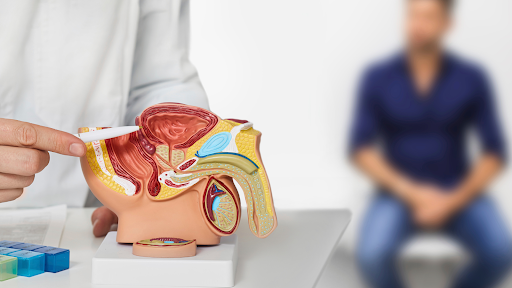Complete Guide to Erectile Dysfunction (ED): In-Depth Causes, Symptoms, Diagnosis, Treatment, and FAQs
Understanding Erectile Dysfunction

Erectile dysfunction, commonly known as ED, is a condition where a man regularly has difficulty getting or keeping an erection firm enough for satisfactory sexual activity. This is a common health issue that affects millions of men worldwide, especially those above 40 years of age, but can also impact younger men.
If this problem continues for more than 3–6 months, it’s not “just stress” or a one-off issue. It can affect confidence, relationships and overall wellbeing. Fortunately, ED is treatable, and understanding it fully helps you seek the right help and solutions.
How Erections Work: A Simple Overview
An erection is a complex process involving your brain, nerves, blood vessels, muscles, and hormones working together.
When a man feels sexually excited:
- The brain sends signals down the spinal cord to nerves in the penis.
- These nerves release chemicals that relax muscles around blood vessels, allowing more blood flow.
- Two chambers called the corpora cavernosa fill with blood causing the penis to become firm and hard.
- To maintain the erection, valves close in the veins to keep the blood trapped inside.
- After ejaculation or when excitement ends, muscles tighten to stop blood flow and the penis softens.
If anything in this process goes wrong—blood flow, nerves, or hormones—ED can occur.
Causes of Erectile Dysfunction in Detail

ED often occurs due to multiple factors affecting the vascular, neurological, hormonal, and psychological systems. Common causes include:
- Vascular Causes (Blood Flow Problems)
Healthy blood vessels are essential for erections. Conditions like:
- Diabetes Mellitus: High blood sugar damages the lining of blood vessels and nerves, reducing blood flow.
- Hypertension (High Blood Pressure): Can stiffen arteries, limiting blood supply to the penis.
- Heart disease/blocked arteries (Atherosclerosis): Fatty plaques narrow arteries reducing blood flow.
- High Cholesterol: Contributes to plaque formation in arteries.
- Smoking: Constricts blood vessels and damages the vessel walls.
- Obesity: Linked with poor vascular health and inflammation.
- Neurological Causes (Nerve Damage)
Erections are triggered by nerve signals, and damage to these pathways can interfere with the process, such as:
- Spinal cord injuries
- Multiple sclerosis
- Stroke
- Pelvic surgeries (like prostate surgery)
- Hormonal Causes
Hormones regulate sexual desire and erectile function.
- Low testosterone can reduce libido and contribute to erectile dysfunction (ED).
- Disorders of the thyroid or pituitary glands may also play a role.
- Prescription Medications
Some medicines interfere with erections, such as:
- Beta-blockers and diuretics for blood pressure
- Antidepressants
- Antipsychotic drugs
- Some anti-ulcer and allergy medications
Always consult your doctor before changing medications.
- Psychological Causes
Mental health impacts sexual performance:
- Anxiety, especially performance anxiety
- Depression
- Stress from work or relationships
- Guilt or embarrassment
These often coexist with physical causes.
- Lifestyle Factors and Age
Unhealthy habits affect erection quality:
- Sedentary lifestyle
- Excess alcohol consumption
- Smoking and drug abuse
- Poor diet
- Age-related changes in blood vessels and hormones
Learn More: Six Tips to Improve Your Mental Health Every Day
Recognizing the Symptoms of Erectile Dysfunction
Common signs include:- Difficulty achieving an erection
- Trouble keeping an erection firm until sex is finished
- Low sexual desire
- Anxiety, stress or frustration about sex
If these symptoms occur frequently for at least 3-6 months, professional evaluation is recommended.
How Is Erectile Dysfunction Diagnosed?
A doctor-led diagnosis follows several steps to understand the causes:- History: Your doctor will ask about symptoms, health conditions, lifestyle habits, stress and medications.
- Physical Examination: Check penis, testicles, blood pressure and nerve reflexes.
- Blood Tests: Sugar, cholesterol, testosterone, kidney/liver function.
- Specialised Tests (if needed): Penile Doppler (blood flow check), Nocturnal penile tumescence test (sleep erection test) or psychological evaluation to assess anxiety, depression, or other mental health issues.
Treatment Options: Comprehensive Overview
ED treatment is personalized and often involves a combination of lifestyle modifications, medications, devices, and sometimes surgery.- Lifestyle Changes Improving general health improves erections:
- Quit smoking and limit alcohol
- Exercise regularly
- Eat healthy, lose weight
- Manage stress through relaxation, therapy, or mindfulness
- Maintain good sleep hygiene
- Oral Medications (PDE5 Inhibitors)
- Sildenafil (Viagra), tadalafil (Cialis), vardenafil (Levitra) are commonly prescribed drugs
- They work by relaxing blood vessels, increasing blood flow to the penis
- Usually taken before sexual activity
- Side effects can include headache, flushing, indigestion but generally safe
- Not suitable for men on nitrates or with certain heart conditions
- Hormone Therapy Testosterone replacement is considered if low levels are confirmed with blood tests.
- Vacuum Erection Devices (VED)
- Pump creates suction to draw blood into the penis
- A constriction ring placed at base maintains erection
- Non-invasive and effective for many men
- Injection and Urethral Suppositories
- Alprostadil injections or pellets inserted into the penis cause muscles to relax
- Used when oral meds fail or not suitable
- Penile Implants
- Inflatable or semi-rigid implants surgically placed
- Offer permanent solution for severe cases
- Emerging Therapies
- Low-intensity shockwave therapy: Stimulates blood vessel growth and tissue repair
- Platelet-rich plasma (PRP) injections: Experimental but promising technique
Learn More: Top Healthy Lifestyle Tips for Better Living
Managing Expectations and Combining Treatments
Addressing erectile dysfunction often means looking at more than one cause. Successful management may involve:- Tackling physical, psychological, and relationship factors together
- Combining medical treatments with counseling for better results
When to Consult a Doctor?
- If ED lasts more than 3 months
- If it affects your confidence or relationship
- If you also have chest pain, dizziness or numbness
- If you already have diabetes, high BP, or heart disease
Early diagnosis leads to better treatment results.



